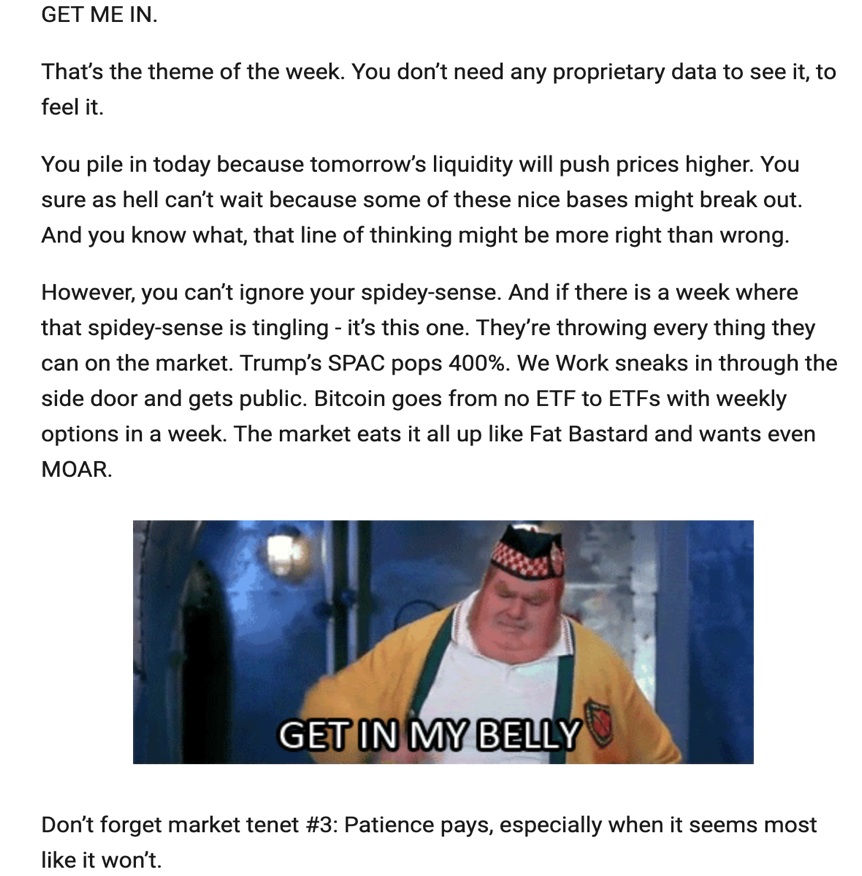Happy Fri-YAY, fam! Thanks for taking a break from your online Halloween costume shopping to read this note. We will keep this brief as financial markets continue to be positive.
Talk of inflation and interest rates continues to dominate the conversation (wash, rinse, repeat). This discourse carries on under the backdrop of stock indices back at all-time highs, with the next inflection point being the November Fed meeting. The Fed has more or less said the taper would begin after that meeting. It will be interesting to see how markets react, if they do, being they have had months to absorb the information.
Adding to the conversation this week, two legendary billionaire hedge fund managers weighed in on Fed policy. In separate interviews, David Einhorn and Paul Tudor Jones essentially called Fed Chairman Powell an idiot for not starting the taper earlier (they were slightly more demure). When either of these guys talk, people do listen. That said, these guys are big market players, so one must take their opinions with a grain of salt as either could have a massive trade that needed tapering to start months ago. It’s always interesting to hear such opinions, but very difficult to take at face value. For those of you inclined, you can watch PTJ’s interview here.
This week, the piece below landed in the inbox from a sharp market observer who writes a blog called The Rotation Report on Substack. It resonates with the High Note approach, provides a nice reminder, and sums things up more succinctly than we can.

High Note Quick Hits
The Chinese Communist Crackdown
While China and U.S. relations have been buzzy for the past few years, the internal dynamic within the country hasn’t been discussed much until this year. Still, there’s quite a bit of tension at play in their communist-capitalist society. One could say they want the best of both worlds – state control and free markets – which are in constant battle.
For years, it felt like the free-market faction of the country was winning the battle. We saw the rise of companies like Alibaba and Baidu, who became important on the global level minting Chinese billionaires left and right. Well, the direction of the wind has changed this year. First, they clamped down on Alibaba’s payment arm, ANT Financial. Founder and CEO Jack Ma even mysteriously disappeared for a solid month. Then they went after the technology sector broadly through restrictive policies and blocking deals. They followed that up by going after their video game industry, allowing Chinese children only three hours of gaming per week. Now, it’s the casinos that are in their sights.
Whether this is just a natural push-pull within the inherently conflicted system of public-owned/private-owned hybrid, President Xi Jinping consolidating power, or a deliberate attempt to damage U.S. investors is anyone’s guess. The takeaway is that investing in China has been very difficult this year, and that doesn’t appear to be getting easier anytime soon.
Adding to that difficulty are the mechanics of how we, as U.S. investors, can actually own stocks in China which is much different than how we own stocks in other foreign countries. The workaround is the VIE System which amounts to shares in a safe in the Caribbean, and you own shares of the safe. If someone or something, for example, the Chinese government, grabbed the shares out of the safe, owning the safe wouldn’t be great. It could be fun to go visit the safe but very detrimental to the investment account. Obviously, it’s not quite that simple, but you get the point. You can read more about the VIE system of ownership here.
Given their massive population and stated determination to advance, China is very important to the future global GDP. They know that advancement doesn’t happen without foreign capital, which is why they have been toeing the line between communism-capitalism up to this point. They are going to have to find a balance that is favorable to foreign investors. Until then, Chinese stocks carry an additional level of risk that’s hard to quantify. Watching from the sidelines is free to do and fun (for some of us).
